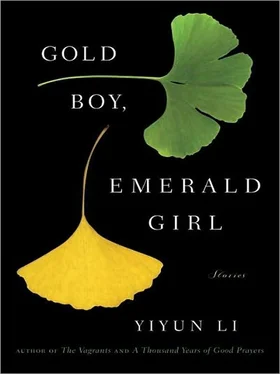“But you may forget,” she said. “I know what it’s like with old people. You make a promise one day and the next day the promise means nothing because you have all this time on your hands and you need to tell them every bit of news.”
“I’ll never see them again.”
“Are they dead?”
They did not live in town, though neither had moved very far away. The distances could be covered easily by a two-hour bus ride, but Ailin had not sent word to Mei and Lan about her husband’s funeral. It had occurred to Ailin before that similar losses might have been kept from her as well, though she had always believed that in the case of a death among the three, the news would find its way to the other two. On what ground to be so blindly confident? she pondered now, and Ying, studying Ailin with a detached sympathy, asked again if her friends had died on her. They were probably still in good health, Ailin replied; only they no longer talked. But why? Ying pressed. Circumstances, Ailin said, and added that fifty years was a long time to keep up.
Ying seemed dissatisfied with the answer. “You don’t stop being a friend because of circumstances,” she said. She herself stayed close to a couple of friends through Internet phone calls, birthday cards, and days spent together on her holidays. Every summer she gave the friends presents she bought with money she earned, clothes and shoes said to be in fashion in Europe.
Life was crowded with many small worries that could replace a friendship with indifference — meals to be prepared, diapers to be changed and washed, critical in-laws and bosses to appease, illness and exhaustion to recover from — and beyond that there was what the photographer had called the sweeping past of time, but Ying was right that one did not discard the sworn sisterhood due to some minor changes in circumstances. “Something happened to us a while ago,” Ailin said finally. “I told a very bad joke, and neither of them wanted to be my friend anymore.”
“A triangle can be unforgiving and unstable for friendship,” Ying said. “What kind of joke was it?”
“They both had their first babies before I had your father — a boy and a girl, so I suggested that they arrange a marriage between the kids,” Ailin said. “It was meant to be a joke.”
“And of course one of the families took it more seriously than the other. It was a silly joke, if you ask me, but it was sillier to stop being friends because of the joke. So don’t blame yourself, Nana,” Ying said. Ailin had never seen her granddaughter act brusquely protective, but perhaps it was what was required of her when she had to speak for herself as well as for her parents. “There would’ve been no trouble in the world if not for the stupid people who make stupid mistakes,” Ying added.
Only it had not been proposed as a joke, nor had it been received as one. The two babies were born a day apart, both as beautiful as their mothers. There would be more children coming to the three families, but the first two were special. Their mothers were sworn sisters, and what could be a better destination than a marriage, so that the two children would continue loving each other beyond playmates, beyond brother and sister? It made sense when a marriage was semiofficially arranged for the two babies; it made Mei and Lan happier that Ailin had been the one to propose it — they worried about her feeling left out, she could see, and with more enthusiasm than either mother she prepared a lavish meal for the small ceremony. None of the three husbands attended the ceremony, treating it with dismissive amusement, as a harmless feminine fantasy. The three men got along all right, but they would not have chosen to be friends if not for their wives; none of them had been told about the sworn sisterhood.
“What happened?” Ying asked. “Did one of the families change their mind?”
“Something horrible happened,” Ailin said. “The boy killed the girl by accident.”
Ying gave a low cry but the shock was at once replaced by fascination. “When did that happen? Why did he do that? How old were they?”
“Not much older than you,” Ailin said, and right away regretted making the connection. “They were sixteen. They went out for a field trip all by themselves and he strangled her by accident.”
Ying made some exclamation in a foreign tongue. “That could not be an accident. He could’ve pushed her into a river by accident, but strangling? How could that happen by accident?”
Ailin shook her head. There had not been much to ask from the boy. The fact that he had ripped her blouse had been enough. The two children had known all their lives about the existence of a marriage arrangement; naturally the boy had expectations, but the girl fought and scratched his face and arms, perhaps out of fear of the urgent rudeness that had turned the boy into an unrecognizable creature.
“Did he rape her?”
The girl’s ease with voicing the word unsettled Ailin. At fourteen, she and her sworn sisters had not known much of the cruelty life had in store. “He didn’t mean to harm her,” Ailin said in his defense. She had always loved the boy, a most generous big brother for her own son, six years younger; she had been selfishly relieved that he was not old enough to understand the situation when the scandalous murder filled the local newspapers.
“But he killed her. I bet this was how it happened. He wanted to have sex, and she didn’t want to. He got out of control,” Ying said. “Did he get a death sentence?”
Ailin nodded.
“He made a stupid mistake but perhaps not enough for a death sentence,” Ying said. “But of course this is China — a life for a life.”
It was the same thing Lan had said when Ailin had begged her to show some leniency toward Mei’s son. A life for a life, Lan said, not meeting Ailin’s eyes; why should she think of giving the boy a future when her daughter had no future left? Unable to reply, Ailin lit some incense in front of the girl’s black-framed picture and prayed to her for a change of heart on her parents’ side; in the picture the girl had Lan’s beautiful features and bashful smile, and Ailin wondered if there had been another boy whom all three of them had not been aware of to account for the girl’s vehement resistance.
Look what you’ve got us all into, Mei yelled to Ailin outside the courthouse after the sentence had been read. As Mei was screaming in Ailin’s face, Lan, winning yet having nothing to share with her sworn sisters anymore, hastened past them with averted eyes. It was the last time Ailin had seen either of her sworn sisters. The news of both families moving away was reported to her by her husband long after they had left; he had clumsily frolicked with their son in the backyard afterward so that she could remain undisturbed in her mourning.
Ying studied the girls in the picture again and asked Ailin to point out the one with the murdered daughter and the one with the murderer son. “I wonder which one of your friends hates the other more,” she said.
“They don’t hate each other as much as you imagine,” Ailin said. She had owed Mei a son and herself a daughter — Lan had written back ten years later when Ailin had sent her a letter, hoping to renew their connection — and no matter what excuse Ailin would find for herself, she was the only one of the three to be indebted. “They both blamed me,” Ailin finished.
Ying replied that it was ridiculous for Ailin’s friends to think so, and that Ailin herself must be crazy to take on responsibilities that she had no business claiming. Ailin shook her head and did not argue with the girl, who, despite having accumulated wisdom beyond her age, was too young to understand that hatred, as much as love, did not come out of reason but out of a mindless nudge of a force beyond one’s awareness. That Mei and Lan had lost their children would not be enough for them to keep their hatred alive. It had been Ailin’s idea to arrange the marriage; it had been her idea to become sworn sisters in the first place.
Читать дальше
Конец ознакомительного отрывка
Купить книгу












